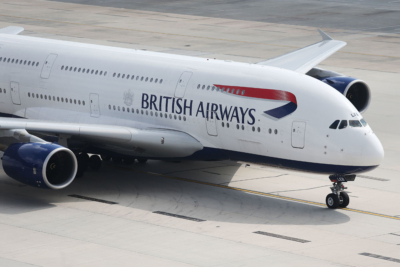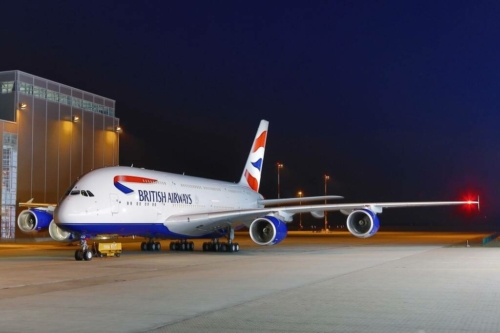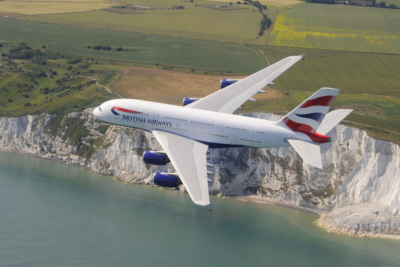British Airways has an A380 problem
Links on Head for Points may support the site by paying a commission. See here for all partner links.
Airline operations are finely tuned: not much has to go wrong before things quickly fall apart.
For British Airways, the struggle this past summer has been aircraft availability: specifically, its fleet of long haul aircraft. Delayed deliveries from both Airbus and Boeing as well as an ambitious summer flying program mean the airline has been stretched thin and has fewer aircraft on standby than it would perhaps like.
It’s no help that BA’s A380 fleet has been particularly unreliable since it was brought back out of storage following covid.
BA flies the A380 on eight routes to Boston, Dallas Fort Worth, Johannesburg; Los Angeles, Miami, San Francisco, Singapore and Washington DC.

With a fleet of 12, BA is one of the largest remaining A380 operators: only Emirates (116) and Singapore (17) have more. Still, 12 is next to none and means there are no spares in case things go wrong. Every A380 needs to be flying, every day.
Unfortunately for both British Airways and its passengers, this isn’t happening. Severe reliability issues have plagued the aircraft since it returned to service in 2021. Two weeks ago, as many as four were out of action at the same time.
3.94% of all British Airways flights scheduled to be operated by the A380 have either been cancelled or operated by alternative aircraft since 1st July, according to my DIY calculations via Flightradar24. In other words almost 1 in 25 flights is cancelled or replaced.
The route most affected by cancellations or aircraft replacements is Washington, with BA prioritising its longest services to Johannesburg, Los Angeles and Singapore.
A particularly embarrassing event earlier this month was when an A380 returned from two and a half months of maintenance in Manila only to go out of service the following day, having flown just two flights.
This has severely tested BA’s operational teams as they scramble to find replacements for the 469-seat behemoth. Even the largest remaining aircraft in the fleet are over 100 seats shy of the superjumbo.
The issues aren’t a new occurrence. A FlyerTalk thread titled “The trouble with the A380 lately” dates back to April 2023 and now numbers 61 pages, with regular complaints about flight delays and cancellations due to engineering issues.
Whilst its clear these problems have been going on for a while, the past summer has really pushed BA’s fleet to its limit. In early September, two out of seven return flights to Miami were cancelled in a single week.
So what’s the problem? After all, other airlines that operate the A380 haven’t had the same issues.
I think we can pin it down to three issues: a niche fleet, limited redundancy and extended storage.
Extended storage
Let’s work our way backwards, starting with extended storage.
Aircraft are not designed to be stored. They are designed to fly regularly, and this keeps all their systems going in the same way that you might struggle to run a 10k after spending weeks as a couch potato.
Planes are particularly fussy, however. The best location for storage over extended periods is somewhere dry, which is why you’ll find the biggest aircraft boneyards in deserts in places like Arizona and Alice Springs in Australia. Closer to home, Spain’s hot and relatively dry climate offers a good spot to park a plane.

Moisture and humidity are the enemies of long-term storage and can cause condensation and corrosion.
Storing an A380 is even trickier. For a start, there are a limited number of airports you can fly them to simply due to runway length. You also need enough space to be able to park them out of the way.
When the covid pandemic first hit, British Airways decided to park the majority of its fleet at an airport in Châteauroux, central France. With an average annual rainfall of 796mm, it is not exactly the Kalahari. In fact, it’s wetter than Heathrow which experiences ‘only’ 618mm of rain per year.
Small fleet & limited redundancy
…. are an issue, both at an aircraft and parts level.
With the A380 out of production – and in any case a niche programme with only 251 ever made – getting spare parts can be a challenge.
If a Boeing 787 breaks down it’s less of an issue. With over 1,100 in operation, spare parts are readily available all around the world. This is not the case for the A380, particularly as the supply chain is dominated by Emirates which operates many more than every other airline combined.
Redundancy is also an issue at the fleet level.
BA only has a handful of A380s. In the grand scheme of things, 12 aircraft is nothing. When one (or two, or three, or four) aircraft are out of action, there are not many other aircraft left to cover.
This is particularly acute for A380 operations. An A350 or Boeing 777 can be more easily replaced like-for-like as these aircraft are in broadly similar size categories and specced with a similar number of seats.
No such luck on the A380: the next largest aircraft in BA’s fleet are more than 100 seats short. Even if you substitute a Boeing 777-300ER you’ll still leave a sizeable number of passengers at the airport.
Unfortunately, BA doesn’t have a spare A380 waiting in the wings at Heathrow for its moment to shine: doing so would be far too expensive for a fleet of this size.
Not enough pilots
Although not mechanical, another issue plaguing the A380 is lack of flight crew.
The pool of pilots at BA able to fly the A380 is limited and was whittled down during covid, when many A380-rated pilots switched to the A350. UK law does not allow pilots to operate more than one aircraft type.
This has left relatively few pilots able to operate the aircraft. Pilots are only legally allowed to fly for 900 hours per 12 month period. After 35 return flights to San Francisco you’re off to the golf course.
Whilst BA has ramped up pilot recruitment and is now funding training for 200 future pilots, it will be years until numbers stabilise. A global pilot shortage also means it cannot simply recruit from elsewhere.
Due to the strict rules governing working hours for flight and cabin crew, even a delay of a few hours can push them out-of-ours and require an entirely new crew to operate. As you can see, even simple mechanical failures could have serious knock-on effects.

Things are getting better
The good news is that the pressure on BA’s long haul fleet is easing. Schedules over the winter typically feature more slack, making it easier to recover from any aircraft outages.
There are other reasons to be positive. British Airways will add additional aircraft to its fleet, allowing more redundancy. This includes the delivery of BA’s tenth Boeing 787-10 as well as the expected return of an A350 that was damaged in a ground collision in April
An Airbus Beluga made a rare landing at Heathrow last week to deliver spare parts for the carbon-fibre jet, which makes it challenging to repair versus conventional metal aircraft.
Shortage of aircraft may also be one of the reasons why the BA Club Suite refit program has slowed over the summer, as all hands (tailfins) were on deck to deliver the schedule. With a slower winter, perhaps we will see these resume on the Boeing 787-8s.
Whether or not BA can turn a corner on its A380s remains to be seen, but a less intense winter flying schedule should help, with more time on the ground to fix and service aircraft.
PS. If you are not a regular Head for Points visitor, why not sign up for our FREE weekly or daily newsletters? They are full of the latest Avios, airline, hotel and credit card points news and will help you travel better. To join our 65,000 free subscribers, click the button below or visit this page of the site to find out more. Thank you.

How to earn Avios from UK credit cards (April 2025)
As a reminder, there are various ways of earning Avios points from UK credit cards. Many cards also have generous sign-up bonuses!
In February 2022, Barclaycard launched two exciting new Barclaycard Avios Mastercard cards with a bonus of up to 25,000 Avios. You can apply here.
You qualify for the bonus on these cards even if you have a British Airways American Express card:

Barclaycard Avios Plus Mastercard
Get 25,000 Avios for signing up and an upgrade voucher at £10,000 Read our full review

Barclaycard Avios Mastercard
Get 5,000 Avios for signing up and an upgrade voucher at £20,000 Read our full review
There are two official British Airways American Express cards with attractive sign-up bonuses:

British Airways American Express Premium Plus
30,000 Avios and the famous annual 2-4-1 voucher Read our full review

British Airways American Express
5,000 Avios for signing up and an Economy 2-4-1 voucher for spending £15,000 Read our full review
You can also get generous sign-up bonuses by applying for American Express cards which earn Membership Rewards points. These points convert at 1:1 into Avios.
SPECIAL OFFER: Until 27th May 2025, the sign-up bonus on the ‘free for a year’ American Express Preferred Rewards Gold card is increased from 20,000 Membership Rewards points to 30,000 points. Points convert 1:1 into Avios (30,000 Avios!) and many other programmes. Some people may see even higher personalised offers. Click here to apply.
SPECIAL OFFER: Until 27th May 2025, the sign-up bonus on American Express Platinum is increased from 50,000 Membership Rewards points to a huge 80,000 points. Points convert 1:1 into Avios (80,000 Avios!) and many other programmes. Some people may see even higher personalised offers. Click here to apply.

American Express Preferred Rewards Gold
Your best beginner’s card – 30,000 points, FREE for a year & four airport lounge passes Read our full review

The Platinum Card from American Express
80,000 bonus points and great travel benefits – for a large fee Read our full review
Run your own business?
We recommend Capital on Tap for limited companies. You earn 1 Avios per £1 which is impressive for a Visa card, and the standard card is FREE. Capital on Tap cards also have no FX fees.

Capital on Tap Visa
NO annual fee, NO FX fees and points worth 1 Avios per £1 Read our full review

Capital on Tap Pro Visa
10,500 points (=10,500 Avios) plus good benefits Read our full review
There is also a British Airways American Express card for small businesses:

British Airways American Express Accelerating Business
30,000 Avios sign-up bonus – plus annual bonuses of up to 30,000 Avios Read our full review
There are also generous bonuses on the two American Express Business cards, with the points converting at 1:1 into Avios. These cards are open to sole traders as well as limited companies.

American Express Business Platinum
50,000 points when you sign-up and an annual £200 Amex Travel credit Read our full review

American Express Business Gold
20,000 points sign-up bonus and FREE for a year Read our full review
Click here to read our detailed summary of all UK credit cards which earn Avios. This includes both personal and small business cards.



 Rhys
Rhys 





Comments (152)